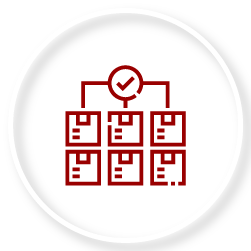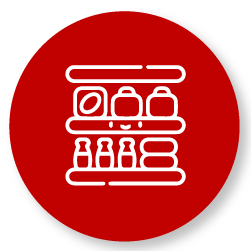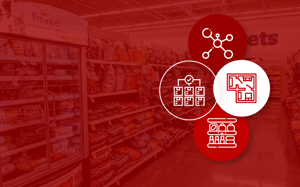Under normal circumstances, investing in category management is the best solution for any retailer who strives to improve their business. However, we are not living under normal circumstances at the moment. COVID-19 has hit retailers especially hard, including FMCG stores and categories. Fortunately, if you are an FMCG retailer, category management can help you.
As a Fast Moving Consumer Goods (FMCG) retailer, you can do many things to improve your business while the world struggles with COVID-19. If you consider category management, you can use all of its aspects to improve your business. That includes clustering, assortment planning, planograms, and floor planning.

What to consider around clustering during COVID-19
Clustering plays a significant part in category management. It forms part of any well-built category management software solution. However, it will only benefit you as an FMCG retailer if you understand it and know how to implement it into your business.
Clustering is the grouping of your stores based on their similar aspects. That includes the location of your stores, the sizes of the stores, or your target customer/demographic. By clustering in this way, you can make COVID-19-related changes to specific clusters to benefit your stores and improve business.
As a retailer, you have suffered significantly in terms of sales since the outbreak of COVID-19. There is no doubt about that. By correctly executing clustering, you will have a sound and complete understanding of your target customers for each cluster.
Whether it be the fact that your customers shop for certain products due to location or the sizes of the stores in the clusters, it may be apparent that consumers shop for convenience products in smaller stores and bulk products in larger stores.
Correct clustering could even determine which clusters attract which bracket of customers based on their LSM group. Namely, economy, mid-tier, or premium customers.
By knowing your clusters and your customers' needs per cluster, you can avoid stocking unnecessary products that will not sell within specific stores based on your cluster. As mentioned before, clustering can keep you in close contact with your customer base.
By clustering, you can also eliminate future aged stock (slow-moving or dead stock) by only selling products in each cluster that you know will sell based on any completed research or analysis on your clusters.

What to consider around assortment planning during COVID-19
There are many benefits associated with correctly executed assortment planning for you as an FMCG retailer.
Once you have successfully created your clusters, assortment planning is the next step. And it includes ensuring that you stock those products in your clustered stores that will appeal to your target customers.
Running parallel and in conjunction with your assortment planning is continued research and data capturing. COVID-19 was first declared a pandemic by the WHO in March 2020. That means at the time of writing this, it has been around for at least a year and a half.
Since March 2020, you would have had the opportunity to conduct sales data analysis and learn all about the changes in the buying behavior of your customers. COVID-19 would have brought with it drastic changes in their buying behavior. But that shouldn't be a problem for you if you shift your assortments to match their demands. In doing so, you can continue to see regular sales and no unexpected drops.
With COVID-19, that means you might find yourself stocking more of those products that customers don't buy often.
For example, you might find an increase in sales of healthier foods and non-perishables. By completing assortment planning, you can quickly understand which items are the most popular so that you can stock more of them. That also means fewer stockouts or empty shelves.
If you’re looking to improve your assortment planning efforts, it’s worth considering your data as well as potentially completing a range review.

What to consider around planograms during COVID-19
Under normal circumstances, correctly executed planograms are at the heart of any successful category management solution. After all, they are the visual representation of your range at the store level.
With COVID-19, a data-driven planogram executed correctly takes on greater significance because of the impact of getting it wrong. The last thing you want is to give more space to a product that isn't selling and less to one that is. It's such a situation that can quickly lead to empty shelves and frustrated customers.
In the early days of the pandemic, you were restricted and forced to implement many different protocols. Depending on where you are, many of these protocols - the wearing of masks and hand sanitizing upon entering stores - are still in place.
You're also likely to see both of these products in many stores. In reality, there is no way you can walk into an FMCG store and not find masks and hand sanitizer products in stock. And not just one variety, but many.
For products such as these - and others that are high in demand, it's critical to ensure that you have data-driven planograms for them. Even more important is that you should place them in high-traffic areas such as your gondola ends or aisles where customers shop frequently.
Free Ebook: Looking to create a performance-enhancing planogram? Let us show you how
By creating the planograms using accurate sales data, you can ensure that you stock enough of the most popular masks, face shields, temperature guns, and sanitizers. Doing so not only boosts your sales but also promotes customer satisfaction and increases the likelihood of them returning.
The fact that COVID-19 has pushed more shoppers to shop online - ecommerce contributed an additional $105-billion in US online revenue last year and accelerated ecommerce by two years - means that fewer customers might be coming into your stores. To entice customers to return, you need to create a shopping experience that will make them want to keep returning.

What to consider around floor planning during COVID-19
Creating a floor plan means allocating the correct space to each category by looking at your sales and trading density. Your floor plan also needs to be data-driven to be effective.
You'd usually expect to create and implement a floor plan when opening a new store, revamping your current store, or changing your strategy. COVID-19 has, of course, forced you to change your strategy. That means looking at your floor plan and understanding how you can change it to improve your business while also providing a pleasant shopping experience for your customers.
With the pandemic, you've been forced to be cautious and, depending on your store size, restrict how many customers you can shop at your store at the same time. That means some stores are not as busy as they once were. There is also the point that many shoppers might still be wary and even scared of shopping in-store.
To alleviate any fears while still adhering to any restrictions, you can tweak the layout of your store at a floor plan level. That includes ensuring that your customers can shop knowing that their personal space is respected.
In terms of considering customers' safety, you can look to reducing hotspots/high-traffic areas. Doing so can give your consumers a sense of ease that there are not many strangers near them while they shop. It also allows you to reduce any aisle congestion because of the hotspots.
Conclusion
A category management solution is beneficial to all FMCG retailers during normal circumstances and trading. COVID-19 has caused anything but normal trading. Fortunately, correct clustering, assortment planning, planogramming, and floor planning will help improve your retail business, no matter the situations you face, including worldwide pandemics.
Need to discuss the retail challenges evident to your business, and how DotActiv can help you to overcome them? You can book a complimentary custom exploratory consultation with a DotActiv expert here.


